Contact Center
.
11 May 2020
H.E Participates in an Online Extraordinary Meeting of Ministers in Charge of Cultural Affairs in the Arab World
H.E calls for a united Arab cultural strategy to safeguard the cultural heritage and make the most of benefit out of it


H.E Shaikha Mai Bint Mohammad Al Khalifa, President of the Bahrain Authority for Culture & Antiquities, participated in an online remote meeting with ministers responsible for cultural affairs in the Arab world 11 May 2020, where they discussed the impact of the coronavirus (COVID-19) on the cultural sector, considering ways to overcome and mitigate its effects on the Arab creative and cultural sectors.
This extraordinary conference of Arab Ministers of Culture held remotely by the Arab League Educational, Cultural and Scientific Organization (ALECSO), was attended by 20 Arab states, in addition to the Arab cultural organizations concerned.
The meeting’s inaugural address was by Arab League Secretary-General, Mr. Ahmed Aboul Gheit, followed by ALESCO Director General Mohammad Weld Omar, Dr. Enas Abdel Dayem, and the President of the 21st session of the Conference of Ministers for Cultural Affairs in the Arab World, as well as His Excellency’s speech, Mr. Mr Ernesto Ottone Ramirez, Assistant Director-General for Culture at UNESCO.
Speaking to this online Arab culture ministers, H.E presented her “Mechanisms and Tools for implementing an Arab United Cultural Strategy to Face the Challenges of Corona virus aftermath”, expressing first her thanks and appreciation to the Arab League Educational, Cultural and Scientific Organization (ALECSO), for the invitation to this online meeting and its strenuous efforts to provide a common background and suitable space for discussing a future common cultural strategy by Arab ministers in charge of cultural affairs.
H.E said that culture is one essential element in the development and progress of societies and nations, given that it is an act of resistance enabling peoples to transcend and achieve a brighter future. H.E said “As Arab countries, we are invited now more than any time before, to think of a common cultural Arab strategy in order to safeguard our cultural heritage and make the most benefit out of it”.
H.E pointed out that the world today has directed its attention to digital platforms and ICTs potential to counter the devastating effects caused by Covid-19 virus pandemic and social distancing measures, which has led to the successful implementation of an online virtual worldwide strategy, providing thus, a digital gateway to enter and visit archaeological sites, museums, exhibitions and other cultural activities.
H.E lauded the adoption of a very promising common strategy to archive the Arab cultural heritage, through which we can enhance exchange of knowledge between Arab countries, as well as the crucial establishment of a shared virtual platform that is capable of unifying the states ‘efforts to support to continuity of the cultural action amid these current exceptional circumstances and their aftermath.
The meeting also discussed the impact of the Covid-19 pandemic on the heritage and culture sectors and the procedures that have been taken to face the repercussions on the two sectors, in addition to the measures taken by Arab states and the mechanisms for setting a unified post-pandemic Arab strategy.
This extraordinary meeting of culture ministers in the Arab region also highlighted the importance of enhancing their respective countries’ preparations and plans to overcome the effects of this pandemic and its aftermath, making their top priority in order to protect and preserve the cultural assets and its sustainable development support. They agreed that this ultimate goal could be attainable by adopting a common comprehensive Arab cultural plan that takes into account the lessons drawn from the virus outbreak, investing in modern ICTs technologies to produce a suitable cultural content adapted for these circumstances, while working on developing virtual creative cultural unique industries. In addition, the ministers of culture also reviewed the direct effects of the current crisis on tourism, museums, cultural production and artists, as well as the measures that they have taken to mitigate the impact of the crisis. They reaffirmed their commitment to intergovernmental dialogue and international solidarity in order to strengthen and unite their efforts.
The meeting also discussed the latest developments with regard to Arab Cultural Capitals for 2020-2026 period, namel5 the Palestinian city of Bethlehem, the capital of Arab culture for the year 2021, Jordanian city of Irbid as the Arab capital of culture for 2022, the Sudanese city of Port Sudan as the Arab capital of Culture for the year 2023, the Lebanese city of Tripoli as the Arab Capital of Culture for the year 2024, the Libyan city of Benghazi as the Arab Capital of Culture for the year 2025 and Kuwait city as the Arab Capital of Culture for the year 2026.







